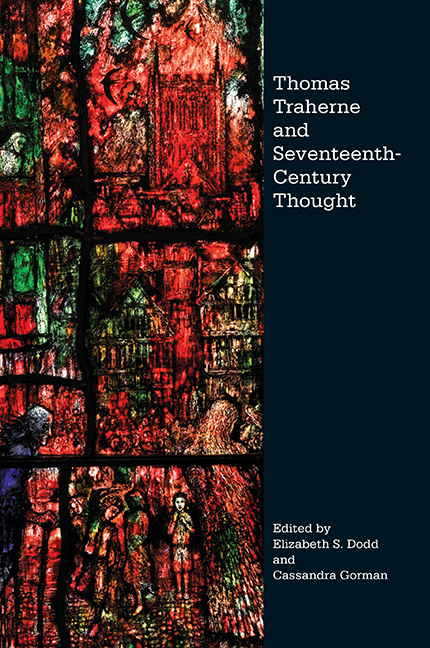Book contents
- Frontmatter
- Contents
- Contributors
- Acknowledgements
- Conventions and Abbreviations
- Foreword
- Introduction: ‘A lover of all Things … An Active ey’ (Select Meditations I.82): Traherne in Context
- PART I PHILOSOPHIES OF MATTER AND SPIRIT
- 1 ‘The Lanthorns Sides’: Skin, Soul and the Poetry of Thomas Traherne
- 2 No Things But In Thoughts: Traherne's Poetic Realism
- 3 Thomas Traherne and ‘Feeling Inside the Atom’
- 4 ‘Consider it All’: Traherne's Revealing of the Cosmic Christ in The Kingdom of God
- PART II PRACTICAL AND PUBLIC DEVOTION
- Afterword by Jacob Blevins
- Chronology of Traherne's Life and Contemporary Intellectual Developments
- Bibliography
- Index
- Index of Biblical References
- Studies in Renaissance Literature
4 - ‘Consider it All’: Traherne's Revealing of the Cosmic Christ in The Kingdom of God
from PART I - PHILOSOPHIES OF MATTER AND SPIRIT
Published online by Cambridge University Press: 05 July 2016
- Frontmatter
- Contents
- Contributors
- Acknowledgements
- Conventions and Abbreviations
- Foreword
- Introduction: ‘A lover of all Things … An Active ey’ (Select Meditations I.82): Traherne in Context
- PART I PHILOSOPHIES OF MATTER AND SPIRIT
- 1 ‘The Lanthorns Sides’: Skin, Soul and the Poetry of Thomas Traherne
- 2 No Things But In Thoughts: Traherne's Poetic Realism
- 3 Thomas Traherne and ‘Feeling Inside the Atom’
- 4 ‘Consider it All’: Traherne's Revealing of the Cosmic Christ in The Kingdom of God
- PART II PRACTICAL AND PUBLIC DEVOTION
- Afterword by Jacob Blevins
- Chronology of Traherne's Life and Contemporary Intellectual Developments
- Bibliography
- Index
- Index of Biblical References
- Studies in Renaissance Literature
Summary
Traherne's contribution to seventeenth-century Christology has often been overlooked. Ever since his rediscovery in the early twentieth century, Traherne has been considered by many critics as a precursor of Blake, Wordsworth, Whitman, Jefferies and other ‘nature mystics’, and somehow ahead of his time. Many have also perceived a lack of connection between Traherne's celebration of the world and his Christian philosophy – or even a disjunction between his identities as priest and poet. M. M. Ross, for example, laments the lack of traditional Eucharistic symbols in Traherne's poetry, which he links to a loss of a sense of the ‘real presence’ of Christ. But as A. L. Clements notes, ‘though one reads criticism to the contrary, Christ does pervade and inform the poems of the Dobell Folio, particularly if we see him as St. Paul did: the last Adam who is a quickening Spirit. Traherne refers to him sometimes overtly, most often subtly or indirectly.’ At the outset of the Centuries, Traherne promises to ‘unfold’ the ‘Mystery, which from the beginning of the World hath been hid in GOD’. Just as that ‘interior Beauty’, so ‘Strange, yet Common’, so ‘Incredible, yet Known’ has not been ‘Esteemed’ (Centuries, Ross, V, I.3), so the Christic presence in Traherne's writing has been overlooked, precisely because it is buried very deeply in the heart of it, suffusing his view of the whole creation.
A close reading of a central chapter in one of his most recently discovered works, The Kingdom of God, confirms how Traherne's understanding of Christ is intimately bound not only to his intense feeling for the material world but also to his fascination with early modern science. Amid an ambitious and wide-ranging treatise on the divine attributes, the material universe, and the human soul, Traherne embarks upon an extraordinary catalogue of wonders as he imagines the sights, sounds and perfumes that would greet a ‘Celestial Stranger’ alighting upon earth. Christ's implicit presence, conveyed in the very texture of the language, is made explicit in the concluding passage that (in confirmation of Clement's observation) reprises St Paul's hymn to Christ by whom ‘all things consist’ (Colossians 1.15–19).
- Type
- Chapter
- Information
- Thomas Traherne and Seventeenth-Century Thought , pp. 84 - 104Publisher: Boydell & BrewerPrint publication year: 2016



